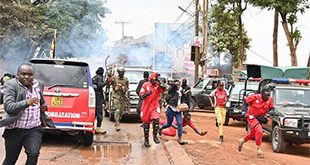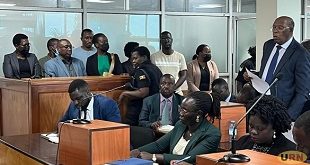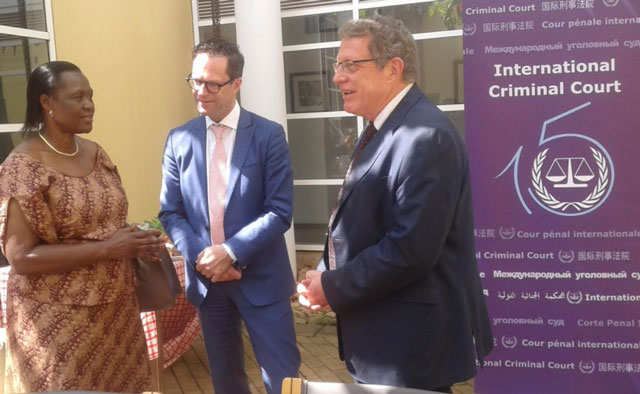
Denmark gives ICC Sh870 million grant to boost viewership of Ongwen trial
Kampala, Uganda | RONALD MUSOKE | The Danish government through its development cooperation agency, Danida, has given the ICC’s Outreach Office in Uganda a grant of €210,000 (Shs 870m) to help communities in northern Uganda where Dominic Ongwen allegedly committed war crimes to follow proceedings of the ongoing trial in The Hague.
The agreement for the “Access to Justice,” project was signed at the Danish Embassy in Kampala on July 17 a date which also commemorates the International Day of Justice. Herman von Hebel, the ICC Registrar signed on behalf of the ICC while Mogens Pedersen, the Danish Ambassador signed on behalf of Denmark.
Ongwen is in The Hague battling seven counts of war crimes including three counts of crimes against humanity (murder, enslavement, inhumane acts of inflicting serious bodily injury and suffering and four counts of war crimes [murder; cruel treatment of civilians, intentionally directing an attack against a civilian population as well as pillaging.
Under the new project, the ICC field Office in Kampala will provide video screening equipment at 23 locations including; Lukodi, Aboke, Pajule, Odeke as well as Coo-rom, Ongwen’s place of birth.
The project will also create and maintain interactive radio programmes and listening clubs through which the affected population could follow and discuss the trial; facilitate travels for cultural and religious leaders as well as journalists to attend trial proceedings at the Court in The Hague; and facilitate sharing those leaders’ experiences related to the trial proceedings with affected communities.
Mogens Pedersen, the Danish Ambassador to Uganda noted, shortly after signing the agreement, that the project presents an opportunity to bring justice closer to the local communities who have suffered violence for more than two decades.
“We are optimistic that the initiative will make international justice more accessible and relevant for the local communities affected by the war,” he said.
Maria Kamara, the ICC Outreach Officer for Uganda and Kenya said the identification of activities under this project was informed by the ICC’s experience of interacting with various actors and stakeholders in northern Uganda for more than 10 years.
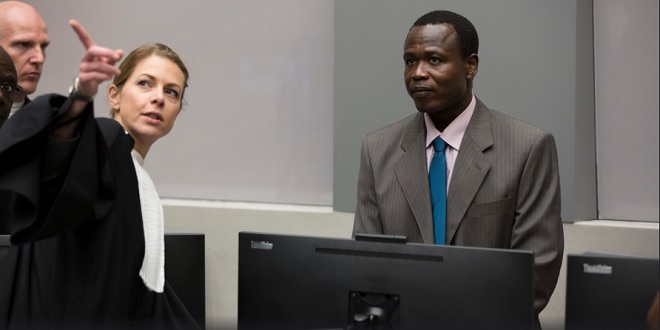
She said the project was conceived out of the need to make it meaningful for the process to be relevant to the communities on whose behalf this trial process is conducted.
“We learnt that engaging local populations through their familiar, trusted structures and channels fosters a more open dialogue; it creates a sense of ownership of the process and a less hostile environment.”
“The project seeks to have practical access for victims and affected communities to follow the trial of Ongwen; it will address their information needs related to the judicial process and by doing so we will manage their expectations that arise from the trial.”
Von Hebel noted that since the confirmation of charges hearing, the ICC registry had gone ahead to identify tools to respond to community needs of access to the ongoing proceedings of the trial.
There have been screening sessions in the affected communities reaching out to about 65,000 people. However, von Hebel said, the screenings have mainly been done at sub-county level leaving out many more people including women, the elderly children and disabled people at the parishes.
“The demand for information has been high and the need for scale-up was unmistakable yet the court did not have resources to take the screenings to the parishes,” he said.
“It is our purpose, to transform these local interests into popular participation and ownership of the processes, and to strengthen local confidence in the Court’s work and in justice and accountability in general.”
“It is our profound confidence, that this project will help us to bring the ICC courtrooms to every single member of the affected community.”
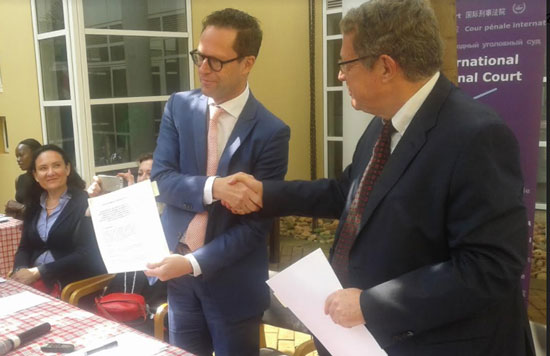
Rwot Onen Acana hails initiative
Rwot Onen Acana, the Paramount Chief of Acholi welcomed the project saying it would help to clear a lot of grey areas where there has been a lack of understanding of the ICC process by the communities.
Rwot Acana said all his people want is fairness for the victims and perpetrators.
“We want fairness for Ongwen and fairness for the victims at home,” he said, “The least we want right now is for the communities to be polarized because of the trial going on at The Hague.”
“As a cultural leader, Ongwen is our son and the victims are our children as well, so we have to be fair to both parties.”
Meanwhile, the paramount chief said the Acholi people’s continued partnership with the ICC does not mean that they have forgotten other processes that lead to justice.
The Acholi community, Rwot Acana said, had advocated for the traditional justice system (Mato Oput) because it is what fits the situation in northern Uganda.
Acana added that the Acholi community is at the moment dealing with many effects of the war that have not been attended to since the guns fell silent over a decade ago.
These challenges, he said, are now manifesting psychologically and there are mental health problems, gender based violence, drug abuse and rampant land conflicts.
“As we fight for justice of our people, we should also include those people who have not yet been attended to.”
Bishop John Baptist Odama of Gulu Diocese said the process will help the people in the communities to understand that the ICC is for the good of humanity.
 The Independent Uganda: You get the Truth we Pay the Price
The Independent Uganda: You get the Truth we Pay the Price
